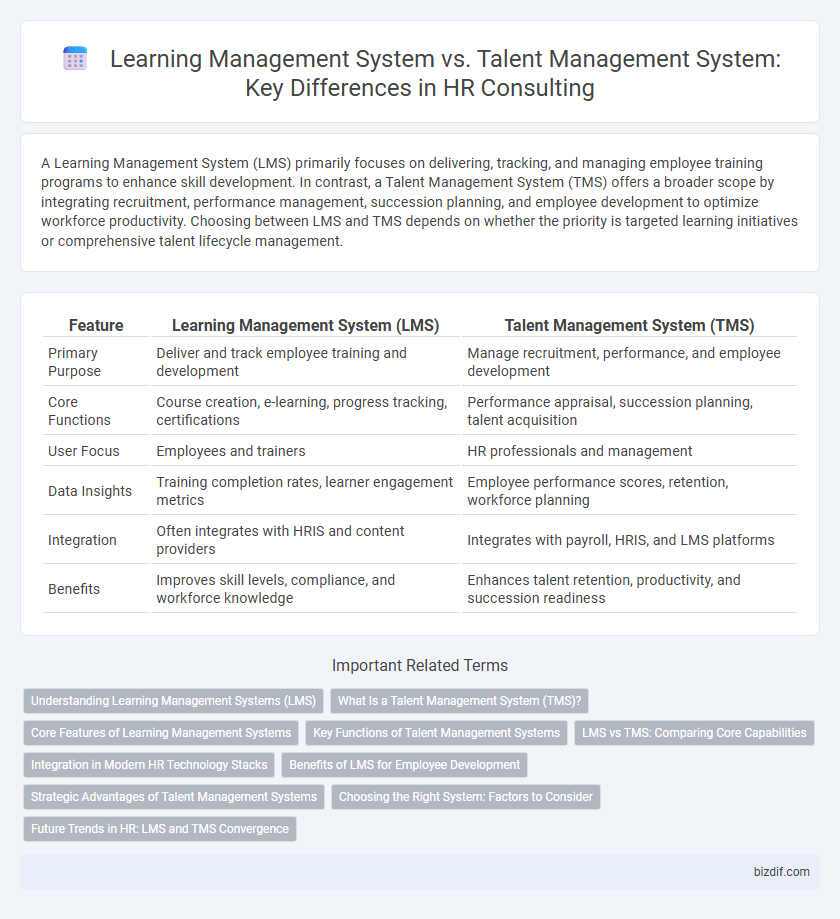A Learning Management System (LMS) primarily focuses on delivering, tracking, and managing employee training programs to enhance skill development. In contrast, a Talent Management System (TMS) offers a broader scope by integrating recruitment, performance management, succession planning, and employee development to optimize workforce productivity. Choosing between LMS and TMS depends on whether the priority is targeted learning initiatives or comprehensive talent lifecycle management.
Table of Comparison
| Feature | Learning Management System (LMS) | Talent Management System (TMS) |
|---|---|---|
| Primary Purpose | Deliver and track employee training and development | Manage recruitment, performance, and employee development |
| Core Functions | Course creation, e-learning, progress tracking, certifications | Performance appraisal, succession planning, talent acquisition |
| User Focus | Employees and trainers | HR professionals and management |
| Data Insights | Training completion rates, learner engagement metrics | Employee performance scores, retention, workforce planning |
| Integration | Often integrates with HRIS and content providers | Integrates with payroll, HRIS, and LMS platforms |
| Benefits | Improves skill levels, compliance, and workforce knowledge | Enhances talent retention, productivity, and succession readiness |
Understanding Learning Management Systems (LMS)
Learning Management Systems (LMS) are specialized software platforms designed to deliver, track, and manage employee training and development programs. They provide organizations with tools for course creation, learner enrollment, progress monitoring, and performance assessment, ensuring efficient skill acquisition and compliance training. Unlike Talent Management Systems (TMS), which focus broadly on recruiting, performance, and succession, LMS primarily enhances continuous learning and professional growth within HR consulting frameworks.
What Is a Talent Management System (TMS)?
A Talent Management System (TMS) is a comprehensive HR software platform designed to streamline recruitment, employee development, performance management, and succession planning. Unlike Learning Management Systems (LMS) that primarily focus on training delivery and tracking, TMS integrates multiple HR functions to optimize workforce planning and talent retention. By leveraging advanced analytics and employee data, a TMS enhances strategic decision-making and aligns talent initiatives with organizational goals.
Core Features of Learning Management Systems
Learning Management Systems (LMS) primarily focus on delivering, tracking, and managing employee training programs, featuring course administration, progress tracking, and e-learning content integration. Core features include automated assessments, certification management, and detailed reporting to monitor learner performance and compliance. These systems optimize workforce skill development by providing scalable, accessible training solutions tailored to organizational needs.
Key Functions of Talent Management Systems
Talent management systems centralize key functions such as recruitment, onboarding, performance evaluation, succession planning, and employee development to optimize workforce capabilities. These systems integrate learning management features but extend beyond training by aligning talent strategies with organizational goals and providing analytics for informed decision-making. Enhanced automation in talent management systems enables seamless competency tracking and career pathing, driving employee retention and productivity.
LMS vs TMS: Comparing Core Capabilities
A Learning Management System (LMS) specializes in delivering, tracking, and managing employee training programs and e-learning courses, emphasizing content creation, compliance, and performance assessments. In contrast, a Talent Management System (TMS) offers a broader scope including recruitment, onboarding, performance management, succession planning, and career development. Organizations seeking targeted training solutions typically prefer LMS, while those aiming for comprehensive workforce management rely on TMS for holistic employee lifecycle oversight.
Integration in Modern HR Technology Stacks
Learning Management Systems (LMS) and Talent Management Systems (TMS) serve distinct yet complementary roles within modern HR technology stacks, with seamless integration enhancing overall employee development and performance management. Integrating LMS with TMS allows for streamlined data flow between training programs and talent assessments, enabling personalized learning paths based on real-time performance metrics. This interconnected approach improves workforce engagement, ensures skills alignment with business goals, and drives strategic talent development initiatives.
Benefits of LMS for Employee Development
Learning Management Systems (LMS) streamline employee training by offering structured, accessible courses that enhance skill acquisition and retention. LMS platforms enable personalized learning paths, track progress, and provide valuable analytics to measure development outcomes effectively. By fostering continuous education and aligning training with organizational goals, LMS accelerates workforce competency and drives career growth.
Strategic Advantages of Talent Management Systems
Talent Management Systems (TMS) provide strategic advantages by integrating recruitment, performance management, and employee development into a single platform, enabling organizations to align talent strategies with business goals. Unlike Learning Management Systems (LMS), which primarily focus on training delivery and tracking, TMS offers comprehensive analytics and succession planning tools that drive informed decision-making and enhance workforce agility. Incorporating TMS facilitates proactive talent acquisition, retention, and upskilling, ultimately improving organizational performance and competitive positioning.
Choosing the Right System: Factors to Consider
Choosing between a Learning Management System (LMS) and a Talent Management System (TMS) requires evaluating organizational goals, as LMS primarily facilitates training and skill development, while TMS offers comprehensive talent acquisition, performance management, and succession planning. Key factors include scalability, integration capabilities with existing HR software, user experience, analytics features, and support for compliance requirements. Prioritizing the system that aligns with workforce development strategies and long-term talent retention ensures optimized human capital management.
Future Trends in HR: LMS and TMS Convergence
Learning Management Systems (LMS) and Talent Management Systems (TMS) are increasingly converging, driven by AI-powered analytics and integrated performance tracking that streamline employee development and career progression. Emerging trends highlight personalized learning paths within TMS frameworks, enabling organizations to align skill acquisition with strategic talent goals efficiently. This convergence enhances workforce agility by providing unified platforms for continuous learning, performance management, and succession planning.
Learning management system vs talent management system Infographic

 bizdif.com
bizdif.com